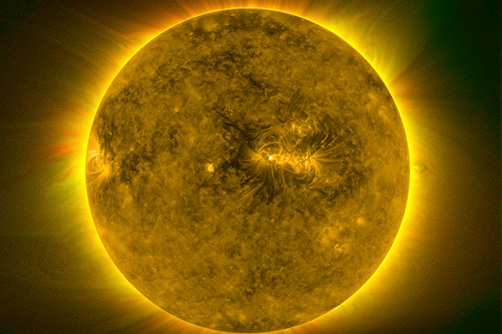The outer atmosphere of the Sun, which extends outward for several million kilometers beyond the solar surface, is called the corona. The temperature there reaches one million degrees and more. The solar surface on the contrary is a mere 5700 degrees “cool”. What causes this coronal temperature increase was one of the biggest yet-to-be-solved mysteries in astrophysics. “To give an analogy, you expect to get colder as you move away from a hot oven, not hotter,” Dominik Utz explains. He is physicist at the University of Graz and part of the international team that has just found an explanation for this phenomenon. The findings have been published in the latest issue of the magazine „Science“.
Magnetic Geysers
From the solar surface so-called spicules, narrow columns of plasma, dynamically shoot upward to heights of about 5,000 km. “It is estimated that at any given moment in time there are about one million of these geyser-like jets in the solar atmosphere,”, Utz says. Now, new high-spatial-resolution and high-time-cadence observations have unveiled ground-breaking insight into the generation mechanism of many spicules, and into the possible contribution of spicules to coronal heating. The scientists have found out that the jets arise where the magnetic field on the solar surface changes dynamically. The hot streams of plasma that thus reach into the atmosphere are responsible for the unusual heating of the corona. “Complex simulations and theoretical studies basing on the latest observations should now enable us to finally solve the mystery of the coronal heating,” the scientists ascertain.
Publication:
Tanmoy Samanta, Hui Tian, Vasyl Yurchyshyn, Hardi Peter, Wenda Cao, Alphonse Sterling,
Robertus Erdélyi, Kwangsu Ahn, Song Feng, Dominik Utz, Dipankar Banerjee, Yajie Chen: „Generation of solar spicules and subsequent atmospheric heating“, Science Vol 366, Issue 6467
